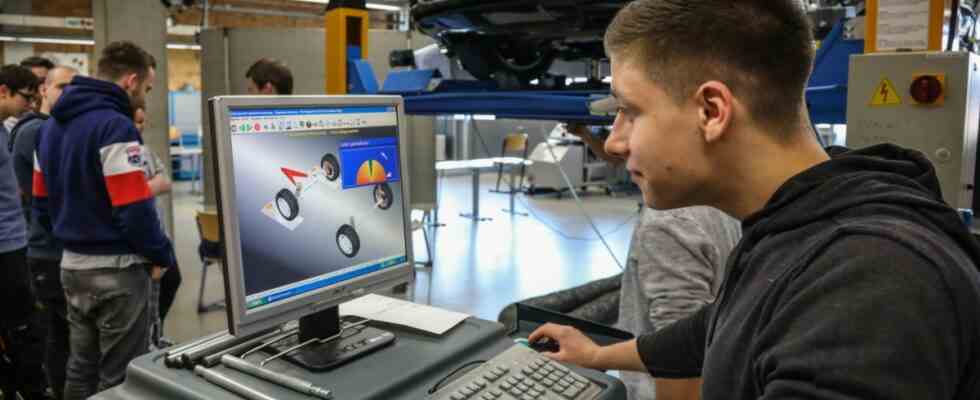The Volksbank Raiffeisenbank Dachau currently lists twelve vacancies on its website, not counting the four internships. It is well known that hardly anyone wants to be a butcher, baker or geriatric nurse. But staff shortages at banks? Martin Richter, press spokesman for Dachau’s VR Bank, is quite frank: The profession of bank clerk, previously a valued guarantor of a secure livelihood, does not have a good image among young people. In addition, the task profile has become more specific. Advice is now the buzzword and means above all the sale of banking products.
The figures from the employment agencies only reflect the officially recorded part of the labor market, companies also use other ways to get staff. They poach it, look for it abroad. Only those who report their vacancies to the agency appear in the statistics. The shows more and more vacancies, also in the district of Dachau, and no longer only in the usual sectors.
The number of vacancies is growing
In 2022, the employment agency for the Dachau district reported 2,448 vacancies, with an average of almost 1,400 offers every month. In 2021, the monthly average was 868 vacancies, compared to 899 the year before. The demand for personnel has clearly increased, says Christine Schöps, spokeswoman for the Freising employment agency, which is also responsible for the Dachau district. In addition, one observes that recruitment processes take longer. And that the shortage is evident in many professions, including in the helper sector. “We’re no longer just talking about a shortage of skilled workers, but about a shortage of workers and skilled workers,” says Schöps.
Your assessment coincides with a Bavaria-wide company survey by the Chamber of Industry and Commerce at the end of December. According to this, 56 percent of the companies in the Munich region have problems filling vacancies. 62 percent worry that the shortage of skilled workers could impair their economic development.
The causes are demographics and changes in the professional world
The causes are complex, with structural change in the professional world and demographics at the top. The baby boomers are slowly retiring and leaving a large staff gap. In addition, digitization, automation and the energy transition are changing entire professional landscapes, which is accompanied by a great need for qualifications in companies and businesses, according to Schöps. As an example, she cites the professions related to transport and logistics, where digitization has long since found its way. “It’s no longer enough to qualify with a forklift license,” she says.
The Dachau VR Bank spokesman Martin Richter also points to strong diversification in the banking sector: in addition to the classic bank clerk, there has long been a dialogue clerk who is also active in social media, or IT clerks. “There’s a lot going on there,” said Richter. Of course, this increased the requirements. “More specialist knowledge is required than before. And you have to be able to recognize connections.”
Youth alone will not do it
Young people alone won’t do it, it doesn’t work out in terms of numbers alone. In 2021 and 2022, 607 training positions were reported to the Dachau Employment Agency, and 161 were still vacant when the training started. In the list of the rarest apprenticeships filled, saleswoman was at the top, followed by clerk, bank clerk, dental clerk and bricklayer. Beate Rudolph, Head of Automotive Training at the Dachau Vocational School, confirms that there is a shortage of applicants even in the automotive sector, which used to be so attractive: “We used to have one and a half to two classes, now it’s a tremor every year, is it enough for two classes or not. ” She sees many reasons why there are so few young people in the apprenticeship professions in particular: low value of manual work in society, increased demands, bad image, but also little money for trainees, long working hours. Changing that is the job of the companies, says Rudolph. “I always ask myself when will the Chamber of Crafts start its charm offensive”?
However, things are not much better in administrative offices and town halls, and there, too, there is always a search for specialist staff. Official spokeswoman Sina Török also confirms this for the Dachau district office. 778 people work there, 25 of them are currently completing an apprenticeship or a dual course of study. For this year, all training places have been taken, but “in fact, filling the positions requires more effort,” says Török.
Post-qualification is one of the solutions
The state also relies on qualification and post-qualification as a solution. “The goal is to get people who are still working in the helper field into in-company training,” explains Schöps. For example, retraining and initial training are also financially supported for older people, including those returning to work. The rapid change in the professional world is also a problem for them. “Four years out of work are enough to lose touch,” says Schöps.
The principle of the support program is similar to that of a dual course of study, the apprentice works partly in the company where he is employed and receives theoretical lessons at the vocational school. Thanks to state subsidies, the salary is higher than a normal trainee salary and thus appeals to people who are already in life. The training period is reduced by a third and can often be afforded on a part-time basis. Schöps admits, however, that employers in particular still have to be recruited: “Not everyone can imagine having a 30-year-old apprentice.”

